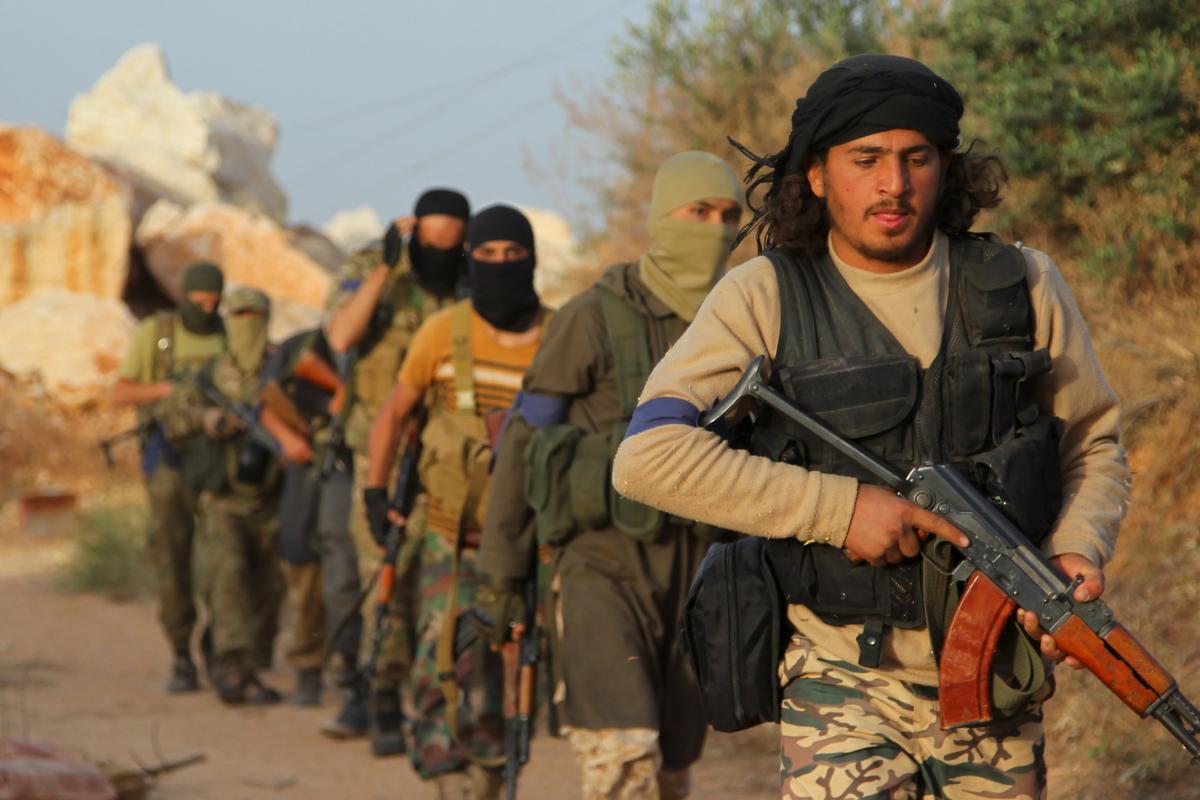European Centre for Counterterrorism and Intelligence Studies, Germany & Netherlands – ECCI
Al Qaeda Closes In on a Stalwart U.S. Ally in Africa
wsj – BAWKU, Ghana—The good news according to Salifu Bashru, an elder of the Mamprusi people, is that if al Qaeda militants attack, they’ll probably kill his rivals from the Kusasi community first.The bitter, 65-year dispute between Mamprusi and Kusasi over which ethnic group rules this small northern Ghanaian city has turned deadly in recent months, with neighbors exchanging machine-gun fire and each side vowing never to let the other get its way.
So Mr. Salifu relishes the idea of al Qaeda gunmen storming through Kusasi neighborhoods even more than he worries about the terror group invading Ghana in the first place. “We wouldn’t help the Kusasi at all,” vowed the 60-year-old, seated in front of a mural listing Mamprusis who have served as paramount chief of Bawku since 1721.
The clash between Bawku’s main ethnic groups is a hyper-local conflict with potentially global implications. Both Ghanaian and U.S. officials fear that al Qaeda militants, who have attacked villages in Burkina Faso just a few miles away, could take advantage of the tensions to establish a beachhead in Ghana, a regional powerhouse and American ally known for its relative stability and prosperity.
Over the past five years, militants from al Qaeda and Islamic State have spread like an ink blot through the semiarid Sahel band of West Africa, killing thousands in Mali, Niger and Burkina Faso.One of their favorite tactics is to inflame local conflicts and grievances to recruit young men. That strategy has helped turn Africa, from Mali in the west to Somalia in the east to Mozambique in the south, into the main battlefield in the decadeslong contest pitting Islamist extremists against the West and its local allies.
“The threat of terrorism hanging around Ghana through the corridors of Bawku is real,” Ghanaian Defense Minister Dominic Nitiwul said in parliamentary debate last month, addressing the Mamprusi-Kusasi conflict.He said the government was sending 500 more troops to Bawku to back 400 already there trying to keep the peace. Community groups have put up posters urging people to report possible jihadi infiltrators.
U.S. Vice President Kamala Harris plans to visit Ghana this week and is expected to announce fresh American aid to address security issues along the country’s northern border.
Kusasi leaders say they haven’t put much thought into how they’ll prevent religious extremism from infecting young men who already use guns to get their way in the name of ethnic self-defense. They’re too caught up in their battle against the Mamprusi.“We know it creates an opening for the jihadis to exploit, but what can we do?” said Thomas Abilla, 80, an adviser to the Kusasi chief.
Militant Islamists, most of them al Qaeda adherents, carried out 1,470 attacks last year in Burkina Faso, to Ghana’s north, a 26% jump from 2021. The violence left 3,600 people dead, according to data from the Armed Conflict Location & Event Data Project, a U.S.-based nonprofit violence-monitoring organization, as analyzed by the Pentagon’s Africa Center for Strategic Studies.The U.S. estimates al Qaeda’s local affiliate, Jama’at Nusrat al-Islam wal Muslimin, or JNIM, controls 40% of Burkina Faso’s territory.
Militants are pivoting southward and launching attacks in Ghana’s coastal neighbors, Togo, Benin and Ivory Coast. The U.S., which is desperately trying to establish a firebreak, fears that Ghana could be next. The majority of its 34 million inhabitants are Christian. Muslims make up a large share in the country’s poorer north.
Expansion into Ghana could ultimately give al Qaeda access to revenue from trade through Atlantic ports. Ghana is a major producer of cocoa and gold. In areas the militants control in West Africa, they forcibly extract taxes from artisanal gold mines, which are common in northern Ghana, according to U.S. military officers in Africa.“We can’t just assume Ghana will be able to withstand this,” said Joe Siegle, research director of the Africa Center for Strategic Studies. “It’s very much in the crosshairs.”
This month, the U.S. and two-dozen European and African militaries for the first time conducted their annual West Africa commando exercises in Ghana—American-led training to address al Qaeda and Islamic State threats. At an army base in the town of Daboya, British commandos coached Ghanaian special-operations troops on treating catastrophic battle wounds, and U.S. Green Berets drilled them on marksmanship.
“We’re not facing country-to-country conflict—it’s terrorists coming in,” said Ghanaian special forces Col. Richard Mensah, the exercise commander.Ghana and its beleaguered neighbors share intelligence on militants’ activities and agreed to conduct joint patrols in contested border areas, he said. The exercises took place a few hours’ drive from the real-world violence in Bawku, a city of perhaps 40,000 people.The ethnic dispute there has led to at least 50 deaths in the past couple of months, local leaders say. A Ghanaian army spokesman said he couldn’t comment on the dispute because it is a national-security issue. The regional police chief wouldn’t discuss security.
Kusasi accuse young Mamprusi gunmen of raiding their neighborhoods. Mamprusi say young Kusasi gunmen ambush vehicles on the road into town, hunting for anyone they suspect of being pro-Mamprusi.
“There’s no line in town, but you know where to cross and where not to cross,” Yawuza Bagura, an administrator at Winamzua Junior High School, said last month. He is a member of the Bissa people, one of several smaller ethnic groups caught up in the back-and-forth.Behind his house, Mr. Bagura pointed out a short stretch of scrubby no-man’s land, a shallow dip in the terrain, then a Kusasi neighborhood less than a mile away. He tried to keep out of sight as he walked through the area, which had been swept by machine-gun fire the previous night. Gunmen recently burned six non-Kusasi houses on the incongruously named Baby Blue Street.
Mr. Bagura said he won’t go to the supermarket across town for fear of being gunned down by Kusasi men. One of his students missed a month of school last year because she was hiding in her bedroom with her family. Mr. Bagura transferred a Kusasi teacher to safety at a school outside Mamprusi turf.Mr. Bagura attended the burial of Bunyamin Hashim, a 42-year-old tailor from the neutral Hausa tribe. Mr. Hashim had been living in another city and decided to risk the road journey home to Bawku for his mother’s funeral.
While he was passing Bawku Senior High School, in a Kusasi area, gunmen stopped the car, forced open the door and sprayed the interior with gunfire, killing Mr. Hashim and two others, according to Mr. Hashim’s family. Both Mamprusi and Kusasi leaders say the attack was presumably carried out by Kusasi fighters.
On the edge of the city, a Kusasi woman was sleeping in her home in February when a stray bullet pierced her metal roof and then her leg. Also that month, someone planted an improvised bomb on a bridge frequently used by security forces to enter and leave Bawku; it was a new tactic in the Bawku conflict, but one used for decades by jihadists throughout Africa and the Middle East.
The constant threat of death is taking a toll on Bawku. Dabre Tahiru Imoro, a member of the unaligned Bissa tribe, closed his agricultural-equipment shop and moved his inventory to his house. Many Kusasi vendors have padlocked their stalls in the central market, which is in a Mamprusi area, and relocated to a new Kusasi market. Business has plummeted for those who remain. A tomato dealer said she used to sell 12 pounds a day and now is lucky to sell one pound, while the rest rots in the heat.
U.S. officials see parallels to other local conflicts militants have manipulated to their advantage. In northern Nigeria, anti-Western Boko Haram fighters sided with Muslim herders in a lethal land dispute with Christian farmers. In Burkina Faso, Islamic State fighters have allied with a group trying to seize gold mines from the Dozos, who are traditional hunters.The dispute over Bawku’s chieftaincy began shortly after the land once known as the Gold Coast became independent from Britain in 1957. Kwame Nkrumah, the first leader of the independent Ghana, ended a long line of Mamprusi paramount chiefs of Bawku by giving the role to a Kusasi, part of a move to replace traditional leaders with political allies.
What followed was a decadeslong series of political and legal decisions in favor of one side or the other. A chief settles land disputes and influences the spending of development funds, strong incentives for each group to want one of its own in the job.The trigger in Bawku this time was a Mamprusi plan in late 2021 to hold a funeral for the last Mamprusi chief of the town, who had died 40 years earlier. The decision to formally mark the old chief’s passing implied that the Mamprusi intended to name a new one. Indeed, last month a powerful traditional leader from a nearby area declared a Mamprusi, Alhaji Seidu Abagre, Bawku’s paramount chief.
The Kusasi were outraged. Ghana’s information minister declared the move illegal and a threat to national security.The fuse was lit; each side thought it had its chief in place, and the killings began.Security forces have enforced an 8 p.m. curfew throughout Bawku. Military armored vehicles race through intersections. One policeman said his team had orders to shoot any armed civilian.Some residents say the heavy security presence has tamped down fighting. Others blame the army itself for civilian deaths.
Lijetu Sumila, a Kusasi woman, said that a few weeks ago, men in military uniforms killed her husband and 12-year-old son and torched her house. She suffered a gunshot wound and sought treatment at a private hospital on Kusasi turf, not daring to go to one in a Mamprusi area. The army spokesman wouldn’t comment on the allegation of military involvement.The Kusasi delegation has withdrawn from mediated peace talks, as has Mr. Salifu on the Mamprusi side. Many delegates said they felt they couldn’t safely reach the negotiating table.“It should have stopped long ago,” Mr. Abilla, the Kusasi adviser, said of the conflict. But, he added, “we will not tolerate any Bawku naba”—paramount chief—“apart from the Kusasi.”
“That’s off the table,” said Mr. Salifu, the Mamprusi elder. “For losing the chieftaincy, we have lost our lands—we have lost our respect.”Al Qaeda, in the meantime, is edging close.In December, gunmen appeared in Mong-Naba, a village in Burkina Faso just five miles from the Ghanaian hamlet of Widenaba.They ordered local women to wear conservative Muslim garb and instructed everyone to avoid talking to Burkina Faso government forces, on pain of death, said residents who have sought refuge in Ghana.
The women adhered to the dress code, but word reached the militants that local security continued patrols. A few weeks after their initial visit, 20 militant gunmen roared into town, riding two to a motorcycle, shot some residents and burned cell-tower equipment, according to villagers and photos taken at the scene.Wari Naomi was among nearly 1,800 residents who escaped on foot to Ghana. She and nine family members walked through the low hills south of Mong-Naba and took refuge in Widenaba. “We were running for our lives,” she said.
Mrs. Wari now camps out in a former grain-storage building and supports her family by helping out at a vegetable stand. Her husband commutes daily back to Burkina Faso to care for their livestock, spending his nights in Ghana for safety.“We see the threats,” said Awal Ahmed, executive director of RISE-Ghana, a private peace-advocacy group that distributes posters warning of militant infiltration. “We know we’re on a ticking time bomb.”




